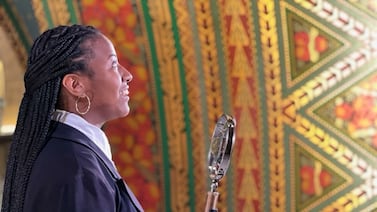Sign up for Chalkbeat Colorado’s free daily newsletter to get the latest reporting from us, plus curated news from other Colorado outlets, delivered to your inbox.
Colorado lawmakers are seeking to ensure that Black history is taught in the state’s public schools at a time of escalating efforts by the Trump administration to squash diversity and inclusion in America’s classrooms.
A bill under consideration in the Colorado legislature would require the State Board of Education to adopt academic standards related to Black historical and cultural studies. Academic standards play a key role in what Colorado students learn in school.
The bill, HB25-1149, passed the House Education Committee Thursday in an 8-5 vote along party lines, with Democrats voting yes and Republicans voting no. The bill now moves to the House Appropriations Committee.
Bill sponsor Rep. Regina English, a Colorado Springs Democrat, said it is not only an educational need but a moral imperative to teach Black history.
“It is our obligation to make sure we are teaching not only our students, but all students, true history and what that looks like for Black Americans,” English said at a press conference before the bill hearing Thursday. “There is more to Black people than slavery and oppression. We are inventors, we are entrepreneurs, we are creators, we are educators, we are doctors, we are attorneys, we are judges, and the list goes on and on.”
President Donald Trump has issued several executive orders aimed at remaking K-12 education in a conservative image, including by ending federal programs that promote diversity, equity, and inclusion and seeking to root out “radical indoctrination” in classrooms.
English said the Black history bill is important at a time when “Black voices are threatened with being silenced through executive orders that are coming down from the national level.”
“Colorado can set the example that we will not tolerate that foolishness here in Colorado, and we will not allow people to divide us and divide our students,” she said.
Colorado’s social studies standards were last updated by the State Board of Education in 2022. The standards say social studies lessons must include the experiences and contributions of several diverse groups, including African Americans, Latinos, Indigenous people, Asian Americans, Native Hawaiians and Pacific Islanders, religious minorities, and LGBTQ+ people.
Opponents of the bill said the state doesn’t need specific Black history standards because the current social studies standards already include it.
Priscilla Rahn, a Denver Public Schools teacher who testified against the bill, called the proposed Black history standards “redundant.” Rep. Lori Garcia Sander, an Eaton Republican, held up a printed copy of the state’s social studies standards and said, “All of the things I heard people say, ‘This is what we want, this is what we wish for,’ it is in here.”
Rep. Jarvis Caldwell, a Colorado Springs Republican, said his two children came home from elementary school during the week of Martin Luther King Jr. Day and shared what they learned about Jim Crow laws and the civil rights movement.
“The important aspects are being taught,” Caldwell said, adding that teaching more than that would be “a capacity and time and resource issue.”
Rep. Jennifer Bacon, a Denver Democrat, pushed back against that argument. There are other instances of “overlaps” — or topics that are covered more than once — in the state’s academic standards, she said. She wondered what it would hurt for Black history to be among them.
“I don’t necessarily disagree that Black history has been a part of our curriculum,” Bacon said. “But the things I consistently hear — I only hear about two time periods: slavery and the civil rights movement. The point of this was to talk about comprehensive Black history. … We are a part of the Revolutionary War history. We are a part of the Civil War history.”
The bill, which is also sponsored by Democratic state Sen. Tony Exum, would create an advisory committee of teachers, librarians, historians, Black history experts, and others to recommend standards. It says the standards should feature “factual accounts of the struggles and contributions of Black Americans in all fields of endeavor” and reflect “Black agency and resistance against oppression.”
Parents, educators, and community members testified at Thursday’s hearing about the importance of teaching students about the contributions of Black Americans.
Anette Bowser, president of the Urban League Young Professionals of Metro Denver, listed several inventions by Black Americans, including the clothes dryer, caller ID, “and even the Super Soaker we love during the summer time.”
Cathy Lees, a Douglas County resident who described herself as a longtime education advocate, referenced a recent debate in the Douglas County School District over an Advanced Placement African American studies course. The school board eventually approved the course after delaying a vote on it because of community concerns.
“Some might call this a victory for educational equity,” Lees said. “I say the damage was done. What message did this send to the white students in Douglas County? The message was clear — Black history, the Black experience, is up for debate in Douglas County.”
Lees said the bill would help ensure Black history is taught, even though Colorado school districts retain control over the specifics such as what curriculum and textbooks to use. Supporters and opponents of the bill both noted that there is little accountability for whether school districts follow the standards, especially in subjects like social studies.
The State Board of Education reviews each set of academic standards every six years, and it’s scheduled to revisit the social studies standards in 2028. If the bill passes, the State Board would review the Black history standards at the same time.
Melanie Asmar is the bureau chief for Chalkbeat Colorado. Contact Melanie at masmar@chalkbeat.org.







